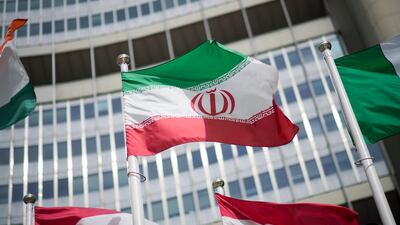The UN nuclear watchdog said on Monday that it has reached an agreement with Iran to extend a monitoring deal of Iranian nuclear sites for a month.
On Sunday, Iran had said its three-month monitoring deal with the International Atomic Energy Agency had expired and UN access to images from inside some Iranian nuclear sites would cease.
A planned statement from the IAEA was pushed back as negotiations dragged on.
Speaking at a news conference in Vienna on Monday, IAEA Director General Rafael Mariano Grossi said a deal had been struck with Ali Akbar Salehi, the head of Iran’s civilian nuclear programme.
But he said the agency was still unable to access images taken by its cameras inside the nuclear facilities.
“I’d want to stress this is not ideal,” Mr Grossi said. “This is like an emergency device that we came up with in order for us to continue having these monitoring activities.”
The deal has created a narrow window for negotiation between the international community and Iran to restore the Joint Comprehensive Plan of Action, the 2015 deal the limit Iran's nuclear capability in exchange for a listing of sanctions.
The US left the deal in 2018, prompting Iran to accelerate its production of uranium to well past the limits set by the deal, despite the UK, China, France, Germany, Russia and the EU remaining signatories.
Iran’s hard-line parliament in December approved a bill that would suspend part of UN inspections of its nuclear facilities if European signatories did not provide relief from oil and banking sanctions by February.
Under a confidential agreement called the “Additional Protocol” with Iran, the IAEA collects and analyses images from a series of surveillance cameras installed at Iranian nuclear sites. Those cameras helped it monitor Tehran’s programme to see if it is complying with the nuclear deal.
It is a black box-type system in which the IAEA cannot check data collected until a later date. The IAEA will have no access to the data gathered over the past three months until at least June 24, Mr Grossi said, adding that he should still be able to provide quarterly updates on Iran in roughly the same way.
Negotiations continue in Vienna to see if both the US and Iran can re-enter the deal, which limited Tehran’s enrichment of uranium in exchange for the lifting of economic sanctions.
Kazem Gharibabadi, Iran’s representative to the IAEA, acknowledged reaching the deal at the same time on his account on Twitter.
He said Tehran’s civilian nuclear agency, the Atomic Energy Organisation of Iran, would keep the material already recorded by the IAEA cameras.
“We recommend the negotiating countries to seize the extra opportunity provided by Iran in good faith for the complete lifting of sanctions in a practical and verifiable manner,” Mr Gharibabadi wrote.
“The data of the next month will remain only with Iran according to the agreement.”
Mikhail Ulyanov, Russia’s ambassador to the IAEA, called Monday’s agreement “commendable.”
“It will help maintain businesslike atmosphere at the Vienna talks on #JCPOA and facilitate a successful outcome of the diplomatic efforts to restore the nuclear deal,” he wrote on Twitter, using an acronym for the deal.
But if a deal isn’t reached in a month’s time, that footage again would be in jeopardy.
Asked about that, Mr Grossi simply said: “We are going to discuss that when we get to that point.”

